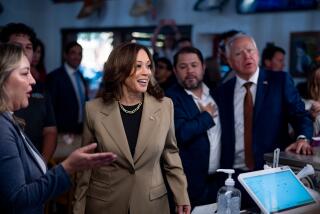Campaign ’96 / CANDIDATES : New Hampshire Voters’ Menu Is Full: 45 Flavors of Presidential Candidates : Meet a few of the ignored, overlooked and unknown seekers of high office.
- Share via
MANCHESTER, N.H. — It’s Thursday afternoon, just hours before the GOP candidates’ televised debate. While the major presidential candidates are prepping, Richard P. Bosa is working the telephone from home, trying to line up radio interviews.
Bosa, a Republican mayor from the northern New Hampshire town of Berlin, has gone on cable television and radio to complain that the “federal candidates are not addressing the issues,” such as the loss of manufacturing jobs here.
At least he found a forum. Other candidates like Russell Fornwalt of New York; Susan Ducey of Milmont Park, Pa., and Tennie Rogers of Tulsa, Okla., are rarely heard from. They are among the 22 Republicans, 21 Democrats and two Libertarians who will be listed on the presidential primary ballot when New Hampshire voters trek to the polls Tuesday.
In cold, analytical terms, they are the darkest of the dark horses--ignored, overlooked and, in some cases, simply unknown to voters and the media.
“What possesses somebody to run for president is beyond me,” said Charles M. Arlinghaus, the New Hampshire GOP chairman. “I have trouble figuring out what possesses Bob Dole or Lamar Alexander to do this. I’m going to have a lot more trouble figuring out what possessed a Russell Fornwalt.”
Assessing the field, he said: “There are some who seem unstable, but there are some who seem normal but they’re still doing this. But there’s this tremendous optimism they have and it’s very refreshing.”
Arlington said more candidates began appearing on the ballot in 1984, after a state law removed the requirement that petitions be gathered to get on the primary ballot. A record number of candidates came in 1992 when there were 65 running for president in New Hampshire.
Most of them are not “has-beens” because they never were. They are historical asterisks running to promote a message or for some other mystifying reason.
Caroline P. Kileen, a Democrat with an Arizona mailing address, “has every intention of winning; she does this for real,” said Robin Vaughn, a part-time staffer at the New Horizons soup kitchen, where Kileen picks up her messages whenever she stops in for a meal.
Kileen, a homeless, gray-haired woman in her 50s who came up with a $1,000 filing fee, is also known as the “Hemp Lady” because her platform calls for legalizing marijuana. Her bumper stickers, left over from her 1992 campaign, carry her message: a picture of a marijuana leaf.
On Thursday, while the big-name candidates were strategizing and preparing for the final television debate before the primary, Kileen’s whereabouts were unknown. “I think she’s around in Concord right now,” Vaughn said.
Even those who try hard to be taken seriously get lost in the sea of political rhetoric, media advertising and other hoopla that washes over New Hampshire every four years.
Illinois businessman Morry Taylor has spent his own money advertising his presidential campaign on television. But a medical staffer at the local hospital drew a blank when asked if she knows who Morry Taylor is. The only wealthy Republican businessman in the race that she knew of was Steve Forbes.
Taylor and three other Republicans--Indiana Sen. Richard G. Lugar, Rep. Robert K. Dornan of Garden Grove, Calif., and former State Department official Alan Keyes--are generally considered at the bottom of the top tier of candidates. They participated in Thursday’s debate but they are often ignored by the dispensers of political wisdom.
At his first sighting of a reporter at a candidates’ forum, Keyes gets right to the point: The high-polling candidates are “either morally indifferent, like Forbes, [Lamar] Alexander and [Bob] Dole, or they are like Pat Buchanan, articulating the issues in a way that’s very destructive, and I think it’s a disservice to moral conservatives. You don’t need to sit with these two extremes. . . . That’s what I’m articulating.”
Dornan tells a couple of reporters that his campaign poster is the only one with a message. It states “Faith, Family, Freedom,” a slogan recently adopted by Buchanan. He wonders if Buchanan will also copy the shamrocks that symbolize Dornan’s Irish heritage.
Before a small group of voters in Derry, Lugar advocates a national sales tax. A New Hampshire voter who has tired of vague ideas and promises, presses Lugar for details. How much? Lugar answers 17%.
Seeking an audience, Dornan, Keyes and Lugar have shown up twice in one week for televised candidate forums--first in Iowa and then in New Hampshire--that were ignored by the “major” candidates.
But at least this group got free television time and didn’t suffer the fate of Democratic presidential candidate Heather Anne Harder of Crown Point, Ind. Not invited to participate, her only recourse was to distribute her brochures after the forum.
They all have messages, if only they can get someone to listen.
More to Read
Get the L.A. Times Politics newsletter
Deeply reported insights into legislation, politics and policy from Sacramento, Washington and beyond. In your inbox twice per week.
You may occasionally receive promotional content from the Los Angeles Times.









